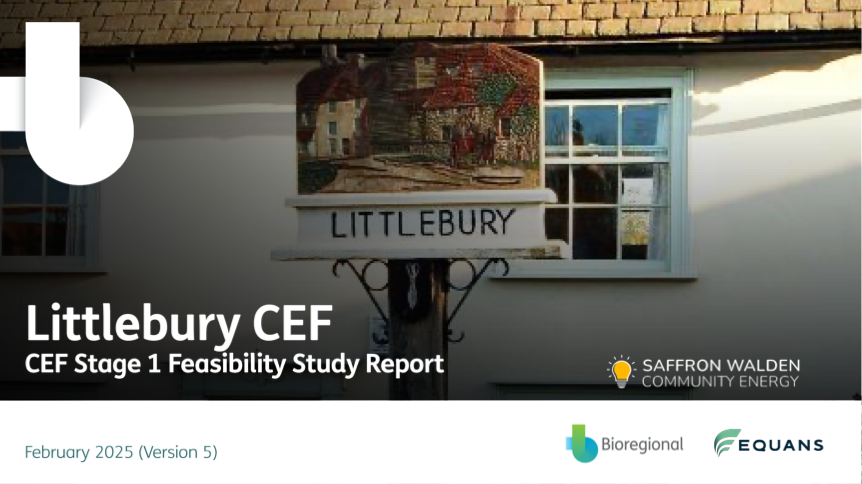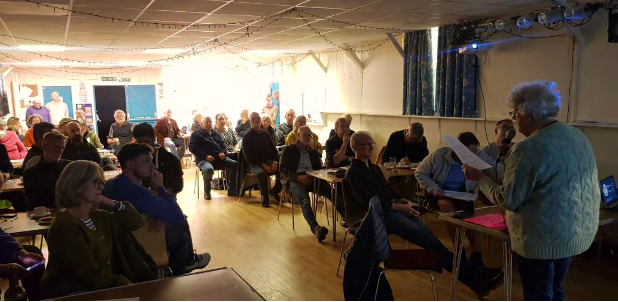The final report on the Feasibility Study has now been finalised and released. You can download and read the full report by clicking the image below.

Summary Conclusions
- A District Heat Network was unlikely to be economic for Littlebury.
- A ‘community-led’ approach, with individual heat pumps and a solar array or wind turbine, could be more feasible but needs further investigation.
Background
The LEP was established to help the village understand its energy usage and find ways to reduce it. This will help improve the energy efficiency of village homes, increasing comfort and reducing cost while also removing reliance on volatile oil markets. The project’s overall goal is to transition the village from fossil fuels to renewable energy sources.
The CEF Feasibility Study was designed to test the technical and economic feasibility of providing low carbon heating and hot water to the village. The study investigated whether we could develop community-scale renewable energy systems with the necessary infrastructure and energy efficiency measures to replace or supplement existing heating systems in Littlebury. Throughout the study, multiple approaches for renewable heating and hot water supply in the village were considered. However, three primary options were assessed in detail:
- A community-wide “District Heating Network” to decarbonise heating.
- A decentralised heat pump model, with individual homes “retrofitting” to reduce energy and heating demand (e.g. undertaking necessary home improvements and replacing boilers/storage heaters etc with heat pumps).
- In addition, a hybrid solution combining both approaches was considered.
To develop the report, consultants from Bioregional and EQUANS collected information, including from community engagement, on Littlebury’s heat demand and interest in retrofit or a heat network. They then performed an “Options Assessment” of the potential solutions. This was followed by analysis of the practical delivery and financial constraints of the favoured options, as well as looking at potential funding, planning risks, governance, and community benefits. A further public meeting was held in the Village Hall in September to review progress.

Finally, there has been a process of drafting and review with the members of the LEP leading to the final report (available from the download link above).
Key Conclusions
The report comes to three main conclusions:
- Both heat network solutions (fully centralised and hybrid), although feasible from an engineering standpoint and able to provide a real terms payback over the expected project lifetime, are unlikely to be economically attractive to Littlebury due to the substantial capital, operating and ongoing costs. This is unlikely to be attractive to any investor required to fund and run the system. The best performing option for the centralised network assumes locally generated electricity from an investor-owned solar farm.
- A decentralised approach is competitive with the centralised heat network solution without local electricity generation. Costs in this solution are borne by the homeowner but can be reduced by government grants already available. Furthermore, installation of solar PV panels on suitable roofs and use of smart electricity tariffs could further reduce operating costs.
- A ‘community-led’ decentralised solution in which the decentralised retrofit approach is supplemented by a community-owned solar photovoltaic (PV) array (10MWp) would further improve economic viability. However, detailed analysis of this option was outside the formal scope of the project. Due to the scale, this solar farm would require third party investment and assumes that the village would be able to act as a single entity in procurement. There are examples of community ownership of solar farms and indeed wind turbines. For instance, Southill Community Energy developed and operates Southill Solar, and has been generating renewable electricity since 2016. Surpluses are invested locally to support low-carbon projects https://southillcommunityenergy.coop/. Ambition Community Energy is an example of a community owned wind turbine https://www.ambitioncommunityenergy.org.
What’s Next?
From the perspective of the LEP group this report rules out further investigation of a District Heat Network solution for the village, because of poor financial viability. However, there are other avenues that we wish to explore further. Of particular importance in Littlebury is that Britain is still on a path to reduce its reliance on fossils fuels, meaning that heating oil will be phased out at some point in the future (currently 2035). This leaves electrical heating as the future, primarily through Air Source Heat Pumps (ASHPs). The switch to domestic ASHPs is already underway in Littlebury Parish, with dozens installed. Switching is greatly aided by upgrading homes to improve energy efficiency (better draught proofing, increasing insulation, radiator upgrades and adding or replacing secondary, double or triple glazing, etc).
The LEP group would like to look at how to plan for and assist the “individual ASHP” solution; Whilst many Littlebury homes are suitable, some might not be, or will need substantial home improvements or installation of central heating first, and we need to investigate this properly. The report also shows the benefit of local energy generation, either through a solar farm or wind turbine. This is worth investigating further and could also be the subject of a further project.
Sustainable Uttlesford
Sustainable Uttlesford (SU) is a new environmental group established to support sustainability and climate change related work in the district. It has mainly grown from the success of Uttlesford District Council’s Zero Carbon Communities grant scheme, which has funded several village and community eco groups over the last three years. A clear demand from many of these groups was:
- Access to expertise in areas such as fund raising, energy savings, renewable technologies, environmental conservation etc.
- A forum for networking and exchanging experience and information.
Saffron Walden Community Energy is transitioning into SU to give a better foundation for our renewable energy and decarbonisation work. We are setting up a meeting between the LEP and SU to help plan the next phase of the LEP.
SU will be launched on 9th April at 7pm at Little Canfield Business Park. Please contact Chris (chris.dodge@swce.co.uk) if you are interested in attending.
